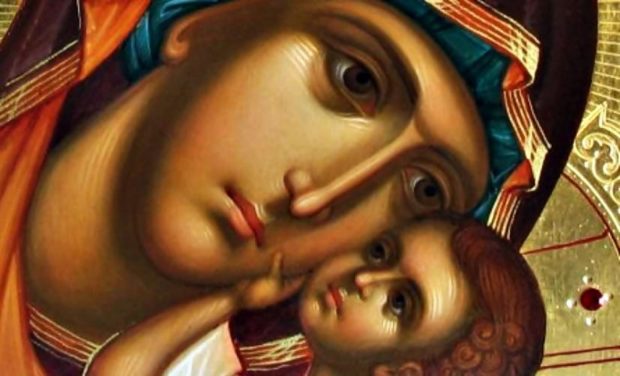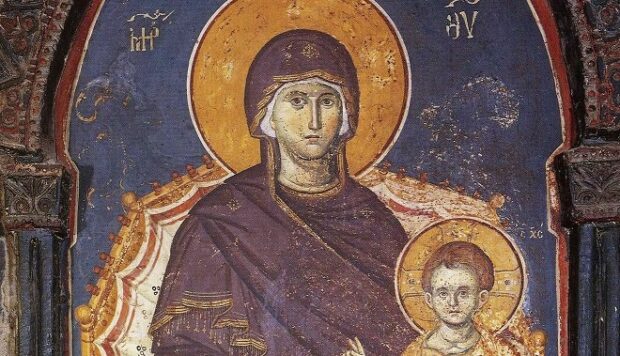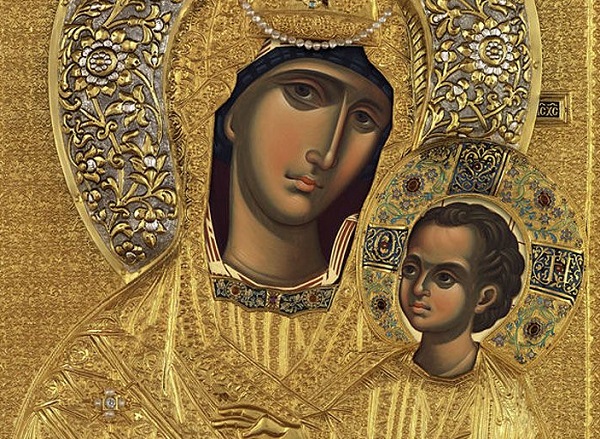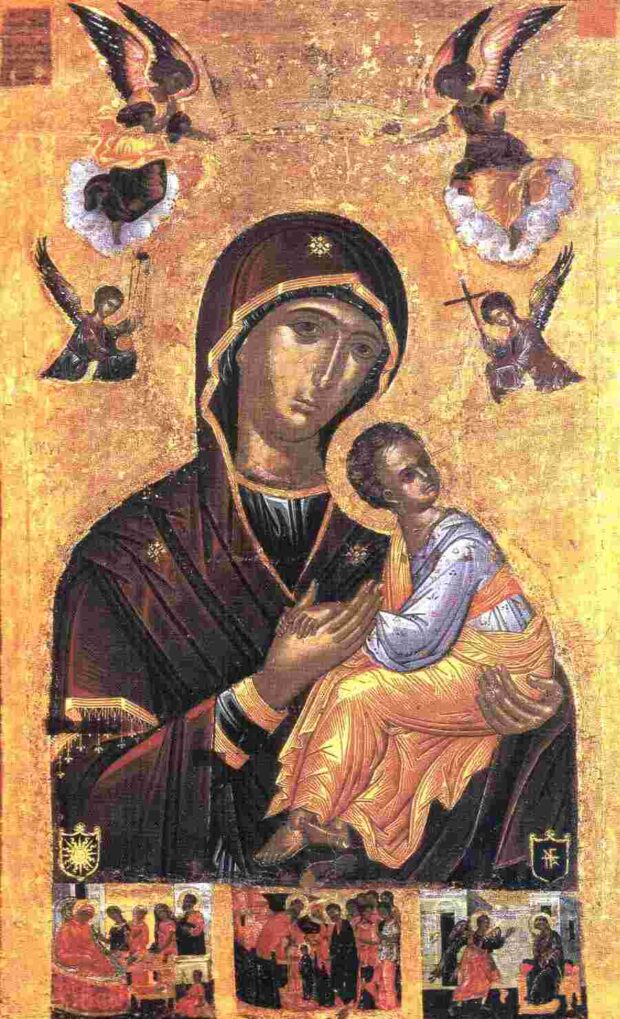Theotokos, the Mother of God, in Orthodox Tradition
15 Αυγούστου 2023

by Rev. Dr. Emmanuel Clapsis
The Orthodox Church celebrates on the 15th of August the Dormition of the Theotokos, the Mother of God. She is considered to be “more honorable than the Cherubim and more glorious than the Seraphim.” She participates in the glory of Her Son and constantly intercedes for all and most especially those who suffer. Furthermore, she is a model and paradigm of what each Christian hopes to be. In her, we have a concrete example of the meaning of membership in the Church. She discloses for us the fullness of the sanctified humanity that all human beings aspire to live in unity with God.
Theotokos (The Mother of God) provides the key to understanding the Christian perception of who she is. The New Testament does not explicitly refer to Mary as the mother of God. Her position as such, however, is inferred from the Church’s understanding of the unity between Jesus Christ and God the Father. The Fathers of the Church affirmed very early in the history of the Church that Jesus was genuinely born of Mary and that Mary’s son was God. St. Irenaeus declares that if God’s birth from Mary is unreal, our redemption is equally unreal. For St. Gregory Nazianzus, acceptance of this title for Mary was a test of orthodoxy.
The opportunity for the Church to affirm that Mary is the mother of God and not simply the mother of a human messiah arose in the first half of the fifth century in the debate between Nestorius, Bishop of Constantinople, and Cyril, Bishop of Alexandria. Nestorius criticized the language used in praise of Mary by one of his bishops, Proclus, who referred in a sermon to Mary as “Godbearer” (Θεοτόκος). Nestorius, in defending Christ’s manhood insisted that Mary should be called “Christ-bearer” (Χριστοτόκος) since God could not be subject to suffering, as was the case with the son of Mary. The Church at the Council of Ephesus (430 AD) deposed Nestorius and accepted the views of St. Cyril of Alexandria that Mary is the mother of God. In this way they affirmed the incarnation of the Word of God, the second person of the Trinity.

Ever Virgin – Αειπάρθενος
The Church, based on the infancy narratives of Gospels, proclaims that Mary conceived her Son Jesus while remaining a virgin and her virginity was not altered at childbirth; she remained a virgin forever. St. Matthew is explicit: “When his mother Mary had been betrothed to Joseph, before they came together, she was found to be with child of the Holy Spirit,” (1:18); “He [Joseph] knew her not until she had borne a son”(1:25). Luke also emphasizes Mary’s virginity at the moment of conception. She is twice called a virgin (1:27), and it is clearly affirmed, “she knows not a man” (1:34). The annunciation account explicitly states only the intervention of God’s Spirit through Whom Mary will give birth to the Son of God.
References to Mary’s virgin motherhood occur in many dogmatic statements. Thus, the Council of Constantinople (384 AD) stated in its creed: “He (the only begotten Son of God) came down from heaven for us and for our salvation. He was incarnate by the Holy Spirit of the Virgin Mary and became man.” The capital phrase in St. Cyril’s letter accepted by the Council of Ephesus was, ,”The Holy Fathers did not hesitate to call the holy Virgin Mary the mother of God.” Likewise, the Council of Chalcedon speaks of the “Virgin Mary, Mother of God according to his humanity.”

‘Panagia’
In Orthodox tradition, the mother of God (Theotokos) is also referred as Παναγία (all-holy). In the Gospel of St. Luke, Mary is referred as “kecharitomene” full of Grace (Lk. 1:28). She is God’s favored one. She has found favor with the Lord (Lk. 1:30); her child is called holy (Lk. 1:35). St. Hippolytus states, without apparent need for explanation, “God the Word descended into the holy Virgin Mary.” St. Epiphanius, in the fourth century, recognizes that Mary is “mother of the living” and that she possesses an uncommon holiness. He states that Mary not only is properly prepared to receive the Word in her womb; she was “graced in every way.”
The mother of God, the all-holy one, constantly prays and intercedes along with all the saints of our Church for the salvation of all. Mary having experienced unjustifiable suffering and grief under the cross of her Son constantly intercedes to Our Lord Jesus Christ for the salvation of all, but salvation comes only from God. If this is the case, why then do we pray to her and the saints? As Orthodox Christians we pray for each other and seek the prayers of others on our behalf. This mutual intercession is an essential characteristic of being Christian. To the Christian believer death is not the final barrier, and so the bond of mutual intercession extends beyond the grave. We pray, therefore, for the faithful departed as well as for the living, and we ask those who fallen asleep to pray for us – not knowing exactly how such prayers prove effective, yet confident that in the sight of God’s mercy no prayer offered in faith can ever be wasted. And among all the faithful departed whose prayers we ask, to whom should we turn more frequently and more fervently than to the Holy Virgin?
The meaning, to an Orthodox Christian, of the Virgin’s intercession for the needs of humankind is most beautifully expressed by the title “joy of all who sorrow”, applied to her in eastern devotion:
Thou art the joy of all who sorrow,
The champion of all who suffer wrong.
Food to the hungry,
Comfort to strangers,
A staff or the blind,
Visitor of the sick,
Protection and aid to all in trouble,
And the helper of orphans.

Mary and Salvation
In Orthodox theology, salvation is primarily an act of God. God initiates a life of communion of all creation with Him through Christ and the Holy Spirit. In and through Christ and the Holy Spirit, humanity and creation live in fellowship with God. Mary, expressing the desire of humans to be saved, accepted with gratitude the will of God to give birth through the Holy Spirit to Christ. The answer of Mary to the archangel’s Annunciation, “Behold, I am the handmaid of the Lord; let it be to me according to your word” (Lk. 1:38), resolves the tragedy of fallen humanity. Mary humbly accepts the will of God and exemplifies the notion of synergia, voluntary co-operation of humanity with God’s will. Had the Word of God become man without Mary’s consent, this would have constituted an infringement of man’s free will, a denial of the divine image in man. We honor Mary, not only because God chose her as the mother of His Son, but also because she herself chose aright; not only because the archangel addressed her as ‘highly favored’ but because she answered, ‘behold the handmaid of the Lord.’
Mary, representing the human race, accepted the love of God and became receptive of divine grace by which she brought Christ into the world. The obedience of Mary counterbalances the disobedience of Eve, the new Eve corresponding to Paul’s description of Jesus as ‘New Adam’ (Romans 5:15-19; 1 Corinthians 15:22, 45-49; see 2 Corinthians 5:17). The Second Eve, according to St. Irenaeus, cooperated with God and liberated humanity from that death which the first Eve’s collusion with Satan had caused.
The Fathers of the Church, through the Eve-Mary analogy, provided a theological interpretation of the role that Mary played in God’s salvific plan. The contrasts that we find in their writings are particularly illuminating: disobedience and obedience, sorrow and joy, woman cursed and woman blessed, a despot devil and a captive, darkness and light, sin and salvation, fall and restoration, condemnation and redemption, death and life, paradise lost and paradise regained. In the Patristic writings Mary is the “cause of salvation,” the “gate of salvation,” the “cause of life.” For the Church, salvation comes from the redemptive life, teachings, death, and resurrection of her Son, Jesus Christ. Mary saves through her intercessions and prayers on behalf of all creation to her son and her participation in God’s plan of salvation by accepting the will of God and becoming the vessel of his humanity. Yet, as a human person, a created being, she too was in need of her Son’s redeeming work. Her Son is her Redeemer and Savior, just as He is the Redeemer of the world.
The Orthodox Church does not accept the idea that the Holy Virgin was exempted from the consequences of the ancestral sin. She fulfilled her unique vocation as the mother of God while she was living in the fallen world, sharing the common destiny of all humanity awaiting salvation.
The Church – as the body of Christ and the temple of the Holy Spirit – is humanity saved, but She is also that which saves humanity. She brings salvation to the world through Christ in whom the whole creation is recapitulated and united with God. We must not forget that it is not Mary but her Son Who is the head of the new humanity, “the head over all things for the Church, which is his body” (Eph. 1:22-23).
Rev. Dr. Emmanuel Clapsis is the former Archbishop Iakovos Professor of Theology at Holy Cross Greek Orthodox School of Theology.
Source: The National Herald



